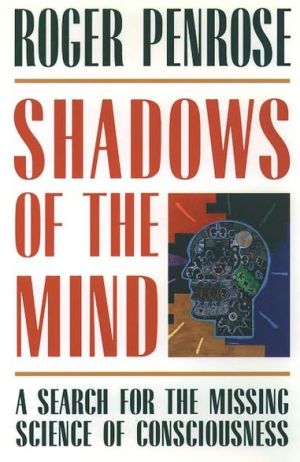

 |

|

The average rating for Shadows of the Mind: A Search for the Missing Science of Consciousness based on 2 reviews is 5 stars.
Review # 1 was written on 2013-07-18 00:00:00 Mark Huneke Mark HunekeThe argument is simple. There are mathematical problems that can't be solved using algorithms - non-computable problems. If you device an algorithm to solve that kind of problems, and let a computer run the algorithm, it would never stop. Yet the human mathematician is able to solve that kind of problems. Computational neuroscience (and Artificial Intelligence) treats the brain as a computer: either there is a neuronal signal or not, very much similar to the 0 and 1 scheme. But that algorithmic representation can't be truly faithful to what's really going on in the mathematician's brain. There must be a non-computable ingredient. Penrose argues then, that there's a deeper level of information processing in the brain, deeper than neural networks. Microtubules is the best candidate for that. Think of a unicellular organism, like an amoeba. How does it know where to go and what to do? It has no nervous system, not even a single neuron. Yet it does what it does, by the means of these cellular automata. One more thing: it appears that things at that molecular level behave according to the strange laws of quantum mechanics, providing the non-computable ingredient. This is an extraordinary approach to the problem of consciousness, and Penrose is a humble man (although in one of his interviews he pointed out to the interviewer that he should be called "Sir" Roger Penrose!) who doesn't claim to have solved the mystery of consciousness. He clearly states that the argument is strong at least for the quality of understanding. And that other qualities of consciousness like feeling, attention, imagination can't be simply explained by algorithms (only), or be regarded as phenomena emerging out of complexity (the cerebellum is as complex as the cerebrum yet it's totally automated and unconscious). |
Review # 2 was written on 2014-06-20 00:00:00 Jean-Francois Leblanc Jean-Francois LeblancFirst and foremost Penrose presents the best argument against computer-simulated human intelligence I've heard to date. In fact it is the only argument that I know of that holds water (and I think by now I have heard them all - from Searle's chinese room to the fundamental energy limitations of recursive simulation models). The mechanics and technical details of the argument get a little complex (Penrose approach is very systematic, often formal, and quite exhaustive - a large spectrum of mathematical, logical and philosophical corner cases are covered) but broad strokes are easy enough to follow. The argument runs as follows. Consider math, which in theory should be the simplest thing for computer to "understand" before we even get to more complicated subjective areas such as emotions, qualia, free will etc. Then use Godel's incompleteness theorem to show that regardless of how you pick your initial set of axioms (to be fed into the computer) there will exist mathematical statements that will be true, given the axioms, but will not be computable (in the church-turing sense) from those axioms. The truthfulness of those mathematical statements can be ascertained by humans but not by universal turing machines (i.e. computers). In other words there is something to human understanding that allows it to determine truthfulness/falsehood of statements and transcend the axiomatic rules from which such statements were derived from. It is exactly that kind of understanding that computers lack. Now, of course, to get to this point Penrose had to quickly cover a lot of ground - Turing machines, Church-Turing thesis, computability, decidability, (non)determinism, chaos, halting problems, tiling problems, discrete vs continuous computation, Godel's theorem etc. It is a great refresher for those familiar with the subject matter and a nice introduction to those who aren't. The second half of the book looks for a non-computational yet scientific basis for human intelligence. Here Penrose moves into a brief overview of quantum mechanics (QM) which was quite fantastic actually (I dreamed of Schrodinger's cat for a couple of nights), he also shows where QM breaks down and where its inconsistencies with general relativity get manifested. Absolutely fascinating overview of the field and its conundrums. No surprises here - we all know TOE is still work in progress and Penrose view is that it is QM that would need to be radically modified to be consistent with relativity, not the other way around. Anyway, QM itself is very well-defined, precise and unambiguous but it is in its transition to non-quantum reality via state vector reduction where quite a few difficulties arise. Or to put it simply QM is perfectly well-defined (i.e. quantum coherence is indeed coherent) till the moment an observer is introduced. But in the end the author brings us to Hameroff-Penrose theory of consciousness that is linked to OR (objective reduction) of a wave function. And in the brain this non-computational process takes place not among the neurons themselves but in cytoskeleton microtubules (within neurons). Voila - we arrive at scientific non-computational basis for human understanding/consciousness What can I say - recruiting Godel to drive a solid very scientific nail through the heart of hard AI (part one of the book) was very very nicely done and just for that the book gets five stars. A gallop through QM and its difficulties was a bit masochistic but I did enjoy it. As far as microtubules - clearly highly speculative but Penrose says so himself at the outset, so I suppose you can take it or leave it. Overall though this is one of the more rewarding books I've read in recent and not-so-recent memory; if you are even marginally interested in the subject matter reading this one should be a no-brainer. |
CAN'T FIND WHAT YOU'RE LOOKING FOR? CLICK HERE!!!